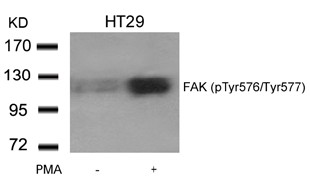FAK (PTK2) pTyr576/577 Rabbit Polyclonal Antibody
Other products for "FAK"
Specifications
| Product Data | |
| Applications | IF, WB |
| Recommended Dilution | Immunofluorescence: 1/100 - 1/200. Western Blot: 1/500 - 1/1000; Incubate membrane with diluted antibody in 5% nonfat milk, 1X TBS, 0,1% Tween-20 at 4°C with gentle shaking, overnight. |
| Reactivities | Human |
| Host | Rabbit |
| Clonality | Polyclonal |
| Immunogen | Synthesized phosphopeptide derived from human FAK around the phosphorylation site of Tyr576/Tyr577 (S-T-YP-YP-K-A) |
| Specificity | FAK (phospho-Tyr576/Tyr577) Antibody detects endogenous levels of FAK only when phosphorylated at Tyr576/Tyr577. |
| Formulation | Phosphate buffered saline (without Mg2+ and Ca2+), pH 7.4, 150mM NaCl, 0.02% sodium azide and 50% glycerol State: Aff - Purified State: Liquid purified IgG fraction |
| Concentration | lot specific |
| Purification | Affinity chromatography |
| Conjugation | Unconjugated |
| Storage | Store the antibody at -20°C. Avoid repeated freezing and thawing. |
| Stability | Shelf life: one year from despatch. |
| Gene Name | protein tyrosine kinase 2 |
| Database Link | |
| Background | Focal adhesion kinase (FAK) is a non receptor protein tyrosine kinase discovered as a substrate for Src and as a key element of integrin signaling. FAK plays a central role in cell spreading, differentiation, migration, cell death and acceleration of the G1 to S phase transition of the cell cycle. FAK regulation includes phosphorylation at multiple tyrosine and serine residues. Phosphorylation of tyrosine generally is associated with positive regulation and growth promotion, however, dephosphorylation at these sites occurs as cells enter mitosis (M-Phase of the cell cycle). In contrast, serine phosphorylation either remains high or is increased as cells enter mitosis and may play a role in focal adhesion disassembly. FAK and its phosphorylation states have been implicated in cancer metastasis and tumor cell survival and adhesion-independent growth. Additionally, recent evidence indicates that elevation of FAK activity in human carcinoma cells is associated with increased invasive potential. A central role in tumor formation and progression suggests that FAK is an attractive target for therapeutic intervention. Focal Adhesion Kinase is a 125 kDa non-receptor protein tyrosine kinase that was discovered as a substrate for Src, and is a key element of integrin signaling. Focal Adhesion Kinase plays a central role in cell spreading, differentiation, migration, cell death and acceleration of the G1 to S phase transition of the cell cycle. Tyrosine 397 is the autophosphorylation site of Focal Adhesion Kinase. The site binds Src family SH2 domains and the p85 subunit of PI3-Kinase. |
| Synonyms | FAK, Focal adhesion kinase 1, FADK1, pp125FAK, Protein-tyrosine kinase 2 |
| Reference Data | |
| Protein Families | Druggable Genome, Protein Kinase |
| Protein Pathways | Axon guidance, Chemokine signaling pathway, ErbB signaling pathway, Focal adhesion, Leukocyte transendothelial migration, Pathways in cancer, Regulation of actin cytoskeleton, Small cell lung cancer, VEGF signaling pathway |
Documents
| Product Manuals |
| FAQs |
| SDS |
{0} Product Review(s)
0 Product Review(s)
Submit review
Be the first one to submit a review
Product Citations
*Delivery time may vary from web posted schedule. Occasional delays may occur due to unforeseen
complexities in the preparation of your product. International customers may expect an additional 1-2 weeks
in shipping.






























































































































































































































































 Germany
Germany
 Japan
Japan
 United Kingdom
United Kingdom
 China
China




